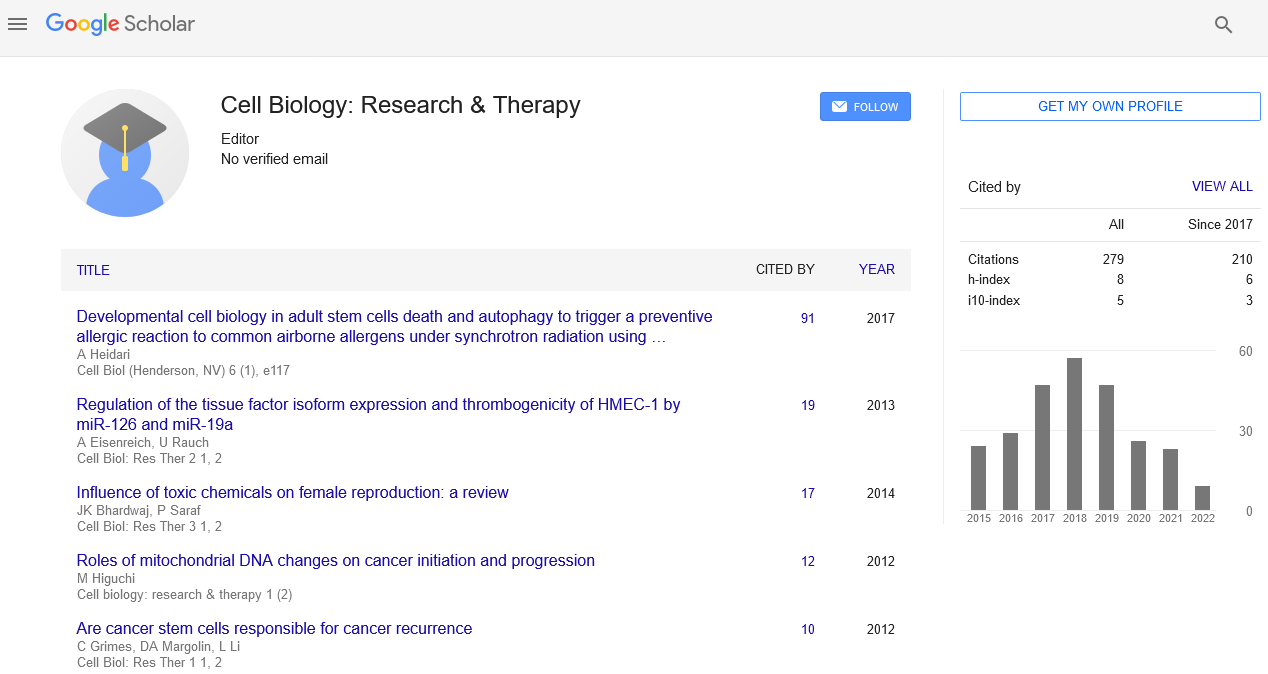Opinion Article, Cell Biol Vol: 12 Issue: 3
Cellular Resilience and Adaptation in Disease: Therapeutic Perspectives
Robin Smith*
1Department for Molecular Cell Biology, University College London, London, United Kingdom
*Corresponding Author: Robin Smith,
Department for Molecular Cell Biology,
University College London, London, United Kingdom
E-mail: smithrobin9@gmail.com
Received date: 02 September, 2023, Manuscript No. AT-23-116143;
Editor assigned date: 04 September, 2023, PreQC No AT-23-116143 (PQ);
Reviewed date: 18 September, 2023, QC No AT-23-116143;
Revised date: 25 September, 2023, Manuscript No AT-23-116143 (R);
Published date: 05 October, 2023, DOI: 10.4172/2324-9293.1000190.
Citation: Smith R (2023) Cellular Resilience and Adaptation in Disease: Therapeutic Perspectives. Cell Biol 12:3.
Description
Cellular resilience and adaptation play critical roles in the development and progression of various diseases. This an overview of the mechanisms by which cells adapt to pathological conditions, with a focus on their potential therapeutic implications. Understanding cellular resilience offers a promising avenue for the development of novel treatment strategies aimed at enhancing the adaptive capacity of cells to combat disease.
Cellular resilience is a fundamental property of living organisms that enables them to adapt to various stressors and maintain essential cellular functions. In the context of disease, cellular resilience and adaptation mechanisms are essential for survival and recovery.
Cellular resilience
Cellular resilience refers to the ability of cells to withstand and recover from various insults, such as oxidative stress, Deoxyribonucleic Acid (DNA) damage, and metabolic perturbations. It involves a complex interplay of molecular pathways that safeguard cellular integrity and function. Key components of cellular resilience include:
Chaperone proteins: Molecular chaperones assist in protein folding and prevent misfolding, ensuring proper protein function and stability.
Autophagy: autophagy is a cellular recycling process that removes damaged organelles and proteins, promoting cellular renewal and survival.
DNA repair mechanisms: Cells employ intricate DNA repair pathways to correct DNA damage and maintain genomic stability.
Cellular adaptation in disease
When faced with pathological conditions, cells can undergo adaptive changes to maintain homeostasis. These adaptations can be beneficial or detrimental, depending on the context. Examples of cellular adaptation include:
Hypertrophy: Cardiac muscle cells may hypertrophy in response to increased workload, as seen in heart disease.
Metabolic reprogramming: Cancer cells often switch to glycolytic metabolism to meet their energy demands, known as the Warburg effect.
Stem cell activation: In response to tissue injury, stem cells can be activated to regenerate damaged tissue.
Therapeutic perspectives
Understanding cellular resilience and adaptation provides a foundation for developing therapeutic strategies.
Pharmacological modulation: Researchers are exploring drugs that can enhance cellular resilience, such as heat shock protein inducers or autophagy activators.
Genetic interventions: Gene therapy approaches may be employed to bolster cellular repair and adaptation mechanisms.
Personalized medicine: Tailoring treatments based on an individual's cellular resilience profile holds for optimizing therapeutic outcomes. Cancer cells often develop resistance to chemotherapy through adaptive mechanisms. Targeting these adaptations, such as inhibiting glycolytic metabolism or enhancing DNA repair inhibition, can improve treatment efficacy.
Neurodegenerative diseases: In Alzheimer's disease, neurons adapt to toxic protein aggregates by upregulating stress response pathways. Therapies aimed at enhancing these adaptive responses are under investigation.
Challenges and ethical considerations: While targeting cellular resilience and adaptation for therapy shows great potential, several challenges and ethical concerns must be addressed. These include potential off-target effects, the risk of promoting tumorigenesis in certain contexts, and issues related to informed consent and patient autonomy in personalized medicine approaches.
Conclusion
Cellular resilience and adaptation are critical facets of disease biology. A deeper understanding of these processes opens new avenues for therapeutic intervention. Harnessing the adaptive capacity of cells can lead to innovative treatments that improve outcomes for patients facing a wide range of diseases. As research in this field continues to advance, the breakthroughs in the development of therapies those promote cellular resilience and adaptation in the fight against disease.
 Spanish
Spanish  Chinese
Chinese  Russian
Russian  German
German  French
French  Japanese
Japanese  Portuguese
Portuguese  Hindi
Hindi 